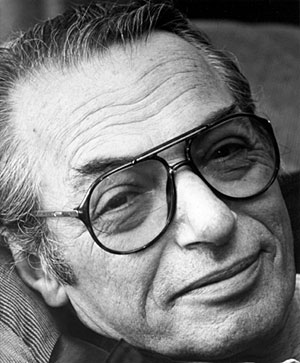

  |
|
|
||||||||||||||||||||||
|
FMS FEATURE... May 1, 2008 Composer Leonard Rosenman Remembered Large crowd of friends and family gather on Warner Bros. scoring stage by Jon Burlingame  Photograph courtesy of Gay Goodwin Wallin. All Rights Reserved. Rosenman scored such other films as Fantastic Voyage, Star Trek IV: The Voyage Home and Cross Creek, and won two Oscars and two Emmys for his film and television music. He died March 4 in Woodland Hills, Calif., at age 83. Judie Gregg Rosenman, his wife of 19 years, introduced a 10-minute video montage of clips from Rosenman's films and TV shows; photographs of the composer, his family and friends; excerpts of interviews over the years; and his Oscar acceptance speeches. "Leonard was definitely the star of his own movie," she said, to knowing laughter from the crowd. All three of his children spoke. "My father was never conventional," Jonathan Rosenman said. "He poured out his feelings and emotions in his art." Gabrielle Rosenman Davis recalled her father and his friend Leonard Bernstein playing four-hand piano back in New York, while Danielle Rosenman Falk drew more laughs by reminding friends that her dad was "a major hypochondriac." On a solemn note, she added that in his last years he suffered from frontotemporal dementia, which robbed him of life "in a world of the intellect" and found him "living in the world of the heart." Actor Robert Brown (Here Come the Brides), one of Rosenman's oldest friends, recalled the young composer writing incidental music for Shakespeare adaptations in the New York theater of the early 1950s. "He was a Schoenberg disciple, a 12-tone genius," Brown said, but unlike many serial composers, "he made it like you wanted to hear the next note." Brown's most eye-opening story involved Rosenman's 1960s LSD experience (which, Danielle said, her father had claimed writer Aldous Huxley told him, "you owe it to yourself to try it"). Rosenman convinced a Beverly Hills psychiatrist who was doing research to allow him to experiment with the illegal drug. Brown accompanied him to the ocean, where a tripping Rosenman watched the waves crashing, saw wild colors, listened to birds and began making his own bird sounds. Brown drove him home where, back at the piano, Rosenman composed the theme to "one of his most important films" (Brown didn't say which one) while still under the influence. From that time forward, however, Rosenman refused to eat mushrooms, he said, eliciting more laughter from the audience. Brown concluded by quoting James Joyce's A Portrait of the Artist as a Young Man: "Welcome, O life! I go to encounter for the millionth time the reality of experience and to forge in the smithy of my soul the uncreated conscience of my race." Comedian Arte Johnson, another old friend, recalled amusing times while vacationing together in Hawaii. Noting that Leonard always called him "dear boy," he quipped, "I don't think he ever really knew my name." Johnson recalled their riotous times creating a comic opera, La Forza de la Fahrshtunkena Gotkes, "the story of a young Italian man who went into the Army as a bass, went to Ethiopia and came back as a soprano." One of their favorite parts, he said, was an aria entitled "Don't Make Pee-pee on the Wall" – another story that had the crowd in stitches. Tiffany Chow did a traditional Hawaiian hula to the song "Beautiful Kauai," after which pianist-conductor Scott Dunn regaled the crowd with stories about his long relationship with Rosenman, based on part on his diary entries from September 1989, when they first met. Dunn repeated stories that Rosenman had told him, including tales of playing chamber music with Albert Einstein at Princeton (where Einstein, a horrible violinist, complained about Rosenman's piano technique). Dunn was a practicing opthalmologist until Rosenman encouraged him to return to music; today he holds positions with both the Pittsburgh Opera and the Hollywood Bowl Orchestra. He called Rosenman a "brilliant musician, genius composer... the best and most supportive friend I ever had. If not for Leonard, I'd still be in the Valley operating on cataracts." Rabbi Steven Jacobs of Temple Kol Tikvah in Woodland Hills opened and closed the two-hour event with prayer. Music from East of Eden, Lord of the Rings and Star Trek IV was played as attendees filed in. Among the other mourners were composers William Kraft, George Burt and Jane Brockman, close friends of Rosenman for many years; actors Martin Landau and Liz Sheridan; conductor David Amos; producer Robert Radnitz (Cross Creek); director Irvin Kershner (RoboCop 2); screenwriter Nicholas Meyer (Star Trek IV); Society of Composers & Lyricists president Dan Foliart; and Academy of Motion Picture Arts & Sciences president Sid Ganis. Attendees were presented with a special 64-page issue of The Film Music Society's quarterly journal, The Cue Sheet, devoted to Rosenman's life and career. ©2008 By Jon Burlingame |
Search
Past Features
Feature Archives
|